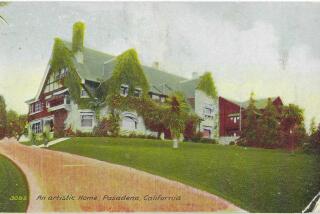Wilmington’s Banning Museum celebrates Christmas--Dickens-style
- Share via
HISTORY HOLIDAY: The Banning Residence Museum in Wilmington, a mansion that once was the home of a prominent Civil War-era family, resolutely stands as a reminder of the community’s beginnings, regardless of the change around it.
To the south of the museum, the Port of Los Angeles has evolved from a small-town harbor into one of the largest and busiest ports in the nation. The community, once predominantly white, is now overwhelmingly Latino. On warm days, the museum grounds serve as Wilmington’s major park--salsa music blares from boomboxes and children romp on the well-kept lawns.
Little is left of 19th-Century English American lifestyle in Wilmington. But inside the museum, Wilmington’s culture remains as it once was.
Last weekend the museum put on its annual holiday celebration, which means celebrating Christmas Victorian style.
Visitors, many of whom travel from other communities for the yearly ritual, were treated to plum pudding, gingerbread and wassail. Period ornaments bedecked the house, costumed carolers sang and bell ringers rang.
So the Banning Residence hasn’t changed with the times. But if it had changed, it wouldn’t be a museum.
*
BLIND JUSTICE: What does a law student do when the lights go out while he’s taking the bar exam? Follow his training and sue, sue, sue.
At least that’s what David Hollander is doing. Hollander contends he failed the intensive three-day bar exam in July, 1993, because the overhead lighting in his area of the testing room took a 16-minute break during the test. Test administrators deemed that there was enough surrounding light and continued the test.
Hollander argues that operators of the Los Angeles Airport Hyatt Hotel, the test site, were negligent in allowing the lapse. “Lights don’t just go off in absence of someone’s negligence,” said Michael Mirharooni, Hollander’s attorney.
Phooey, says Hyatt attorney Robert Anderson, who argues that Hollander should be suing the State Bar of California. “If the lights go out in the last minute of a football game and the referee requires the kicker to kick the winning field goal in the dark, who’s to blame, the referee or Con Edison?” Anderson asked.
Though Anderson said he sees the lawsuit as a frivolous publicity stunt, Mirharooni disagrees. “I think this is a really important case,” he said. Still, none of Hollander’s test mates has chosen to sue after the incident, as far as either lawyer knows.
Hollander is seeking unspecified damages to compensate for the “economic injuries, mental distress and other injuries” he incurred from the incident, Mirharooni said. Although he passed the test on a second try in February, he is still looking for work as a lawyer after losing a job that was contingent on his passing the first test.
So wouldn’t any fledgling lawyer worth a writ handle such a matter this way? Not according to Anderson. “You’re supposed to bounce back; that’s what lawyers do,” h said.
*
BAD TIMING: If the clocks in the Torrance courthouse are any reflection of America’s justice system, the country’s in big trouble. The question in many courtrooms is not “Who dunnit?” but “What time is it?”
Depending on which courtroom you were in one recent morning, it was 10:30, 11:30 or 12:55, according to clocks on the walls. Courthouse workers say the clocks have been out of kilter since the Northridge earthquake rattled the building in January.
“We tell people it’s a different time zone here,” joked Mark Lomax, acting court administrator.
Lomax said the clocks cannot be repaired individually because they are linked to a master clock in the courthouse. One courthouse worker said numerous calls to county workers requesting their help with repairs have proved a waste of time. Though months have passed, many clocks are still wrong.
County officials say the repairs, which will probably be completed in the next few weeks, were delayed by high costs. Fixing the master clock will cost about $2,800.
QUOTE OF THE WEEK
“It’s something that he’s always going to have to deal with. But I’d rather accept the check and be the winner with controversy than be the loser.”
--Republican consultant Tom Shortridge, on anti-smoking Assemblyman Steven T. Kuykendall accepting a $125,000 check from tobacco giant Philip Morris. J3
More to Read
The biggest entertainment stories
Get our big stories about Hollywood, film, television, music, arts, culture and more right in your inbox as soon as they publish.
You may occasionally receive promotional content from the Los Angeles Times.










